To brew ginger tea for anti-inflammatory benefits, start by selecting fresh, firm ginger root with smooth skin. Wash and thinly slice 1-2 inches of ginger per cup of water. Bring water to a boil, then pour over the ginger in a teapot. Steep for 5-10 minutes for mild tea or 15-20 minutes for a stronger brew. Strain and enhance with lemon, honey, or cinnamon if desired. Enjoy hot or iced, aiming for 1-2 cups daily to harness ginger's anti-inflammatory properties. Remember to start with smaller amounts and gradually increase to assess your tolerance. The journey to revealing ginger tea's full potential is just beginning.
Key Takeaways
- Select fresh ginger root with firm, smooth skin and slice it into thin rounds or small chunks.
- Use 1-2 inches of ginger per cup of water, depending on desired strength.
- Steep ginger in boiling water for 5-10 minutes for mild tea or 15-20 minutes for stronger brew.
- Enhance anti-inflammatory effects by adding lemon, honey, or turmeric to the brewed tea.
- Consume 1-2 cups daily, equivalent to 4 grams of ginger, for optimal anti-inflammatory benefits.
Health Benefits of Ginger Tea
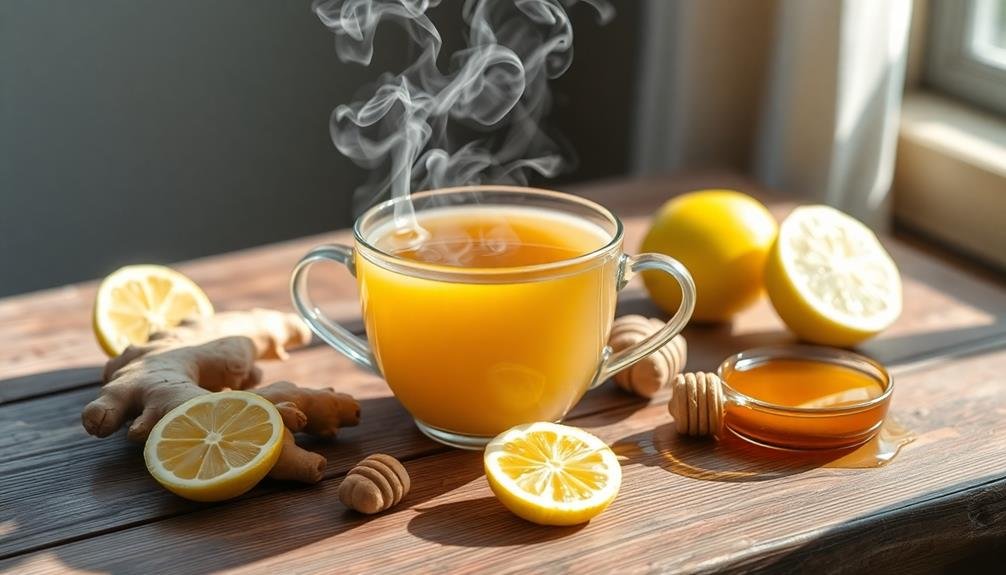
With a long history of medicinal use, ginger tea offers numerous health benefits. It's renowned for its potent anti-inflammatory properties, which can help reduce muscle pain and soreness after exercise. You'll find that regularly consuming ginger tea may alleviate symptoms of osteoarthritis, particularly in the knees.
Ginger tea is also effective in combating nausea and vomiting. If you're prone to motion sickness or experiencing morning sickness during pregnancy, sipping on ginger tea can provide relief. It's also beneficial for those undergoing chemotherapy, as it may help manage nausea associated with the treatment.
You'll be pleased to know that ginger tea can support your digestive health. It aids in reducing bloating, gas, and indigestion by promoting the movement of food through your digestive tract. Additionally, ginger tea may help lower blood sugar levels and improve heart disease risk factors in people with type 2 diabetes.
Lastly, the antioxidants in ginger tea can boost your immune system, potentially helping you fight off colds and flu. It may also contribute to better brain function and protect against age-related cognitive decline.
Selecting Fresh Ginger Root

When selecting fresh ginger root for your tea, look for three key qualities: firmness, smoothness, and aroma. Choose pieces that feel heavy for their size and have taut skin without any wrinkles or soft spots. The surface should be smooth with minimal blemishes or knobs. A strong, spicy scent indicates freshness and potency.
Avoid ginger roots that are light, shriveled, or have a moldy smell. These are signs of age or improper storage. If possible, break off a small piece to check the interior. It should be moist and fibrous, not dry or discolored.
Here's a quick guide to help you select the best ginger root:
| Characteristic | Good Signs | Bad Signs |
|---|---|---|
| Texture | Firm, heavy | Soft, light |
| Skin | Smooth, tight | Wrinkled, loose |
| Aroma | Strong, spicy | Weak, moldy |
| Color | Pale yellow | Dark, discolored |
Store your fresh ginger in a paper bag in the refrigerator's crisper drawer. It'll stay fresh for up to three weeks. For longer storage, freeze peeled and sliced ginger in an airtight container for up to six months.
Preparing Ginger for Brewing
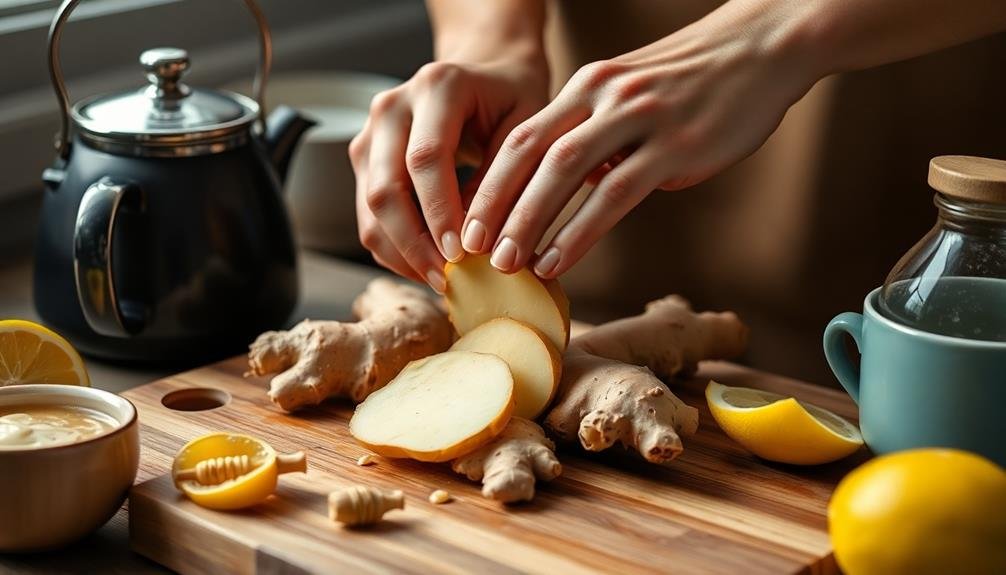
Now that you've selected your fresh ginger, it's time to prepare it for brewing. Start by washing the ginger root thoroughly under cool running water to remove any dirt or debris.
Use a spoon to gently scrape off the thin outer skin, or leave it on if you prefer a stronger flavor. Slice the ginger into thin rounds or small chunks, depending on your taste preference. The thinner you slice it, the more surface area will be exposed, resulting in a stronger brew.
For a milder tea, use about 1 inch of ginger per cup of water. If you like it spicier, increase the amount to 2 inches per cup. You can also grate the ginger using a microplane or cheese grater for an even more potent brew.
If you're planning to make a large batch, consider freezing some prepared ginger for future use. Simply place the sliced or grated ginger in an airtight container or freezer bag. When you're ready to use it, just add the frozen ginger directly to your brewing water. This method preserves the ginger's flavor and beneficial compounds.
Basic Ginger Tea Recipe
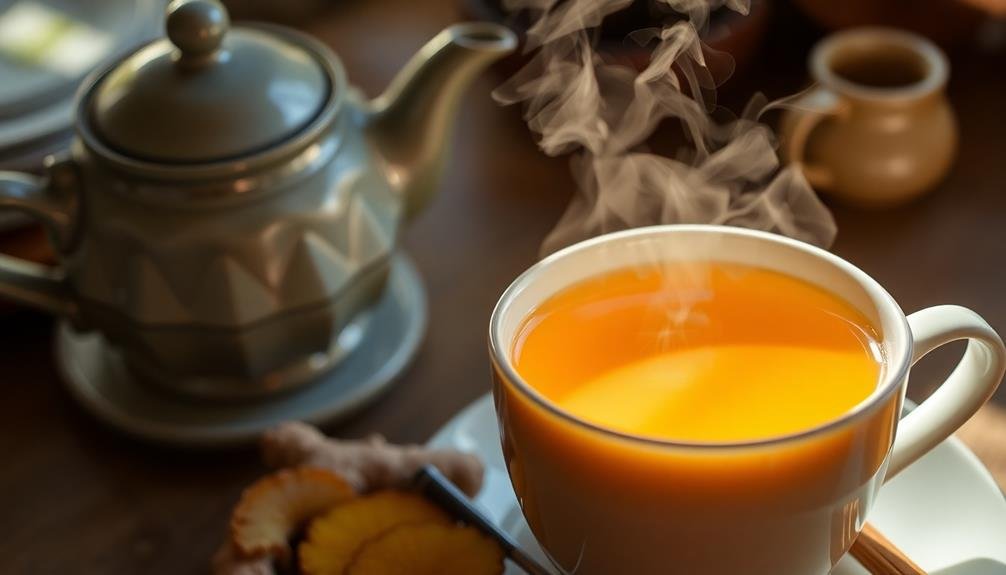
After preparing your ginger, it's time to brew a simple and delicious ginger tea. Start by placing your sliced or grated ginger into a teapot or heat-resistant container. Pour about 8 ounces of boiling water over the ginger for each cup of tea you're making. Let the mixture steep for 5-10 minutes, depending on how strong you prefer your tea.
Once steeped, strain the tea into your cup using a fine-mesh strainer or cheesecloth. You can enhance the flavor and health benefits by adding other ingredients:
| Ingredient | Benefit |
|---|---|
| Lemon | Vitamin C boost |
| Honey | Natural sweetener |
| Cinnamon | Blood sugar control |
| Turmeric | Extra anti-inflammatory properties |
If you'd like your tea sweeter, add honey or your preferred sweetener to taste. For a revitalizing twist, let the tea cool and serve it over ice. You can also make a larger batch and store it in the refrigerator for up to three days. Remember, the longer you steep the ginger, the stronger and spicier your tea will become, so adjust the steeping time to suit your taste preferences.
Enhancing Flavors With Ingredients

Building on the basic ginger tea recipe, you can create a more complex and flavorful brew by incorporating additional ingredients.
Lemon is a popular addition that not only enhances the taste but also boosts vitamin C content. Simply squeeze half a lemon into your ginger tea or add a few slices to your cup.
For a sweeter flavor, try adding honey or maple syrup. These natural sweeteners complement ginger's spiciness while offering additional health benefits.
If you're looking for a more aromatic experience, consider adding a cinnamon stick or a few cardamom pods to your brew.
To create a soothing bedtime blend, mix in some chamomile flowers or lavender buds. These herbs can promote relaxation and improve sleep quality.
For an immunity-boosting tea, add a few sprigs of fresh mint or a tablespoon of turmeric powder.
If you enjoy a stronger tea, experiment with black or green tea leaves. Steep them alongside the ginger for a robust flavor profile.
Don't be afraid to mix and match these ingredients to find your perfect combination. Remember, the key is to start with small amounts and adjust to your taste preferences.
Steeping Time and Temperature
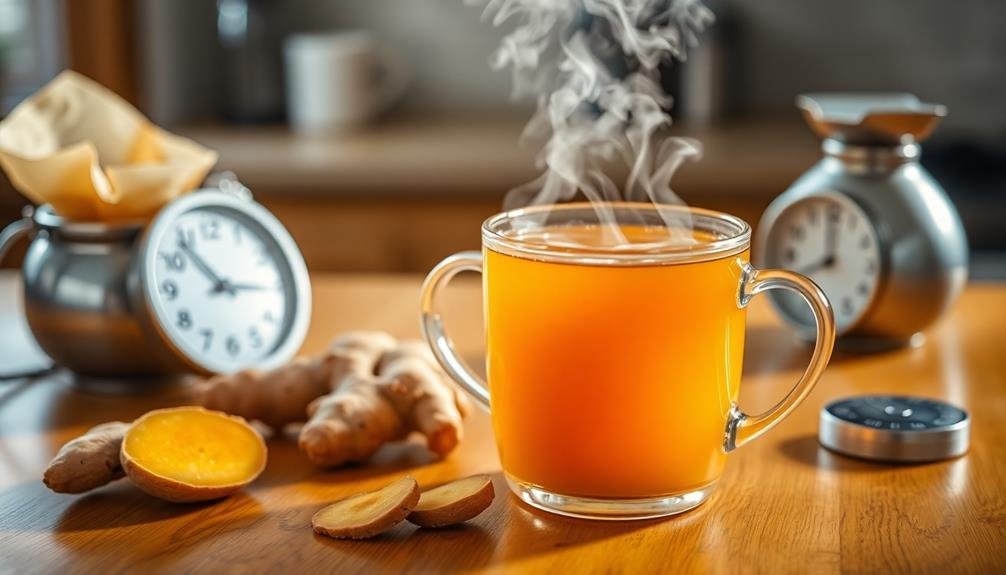
When it comes to brewing the perfect ginger tea, steeping time and temperature play essential roles in extracting the ideal flavor and beneficial compounds. For best results, you'll want to use water that's just below boiling point, around 190-200°F (88-93°C). This temperature range helps release ginger's beneficial compounds without making the tea too bitter.
As for steeping time, it depends on your desired strength and the form of ginger you're using. Here's a handy guide:
| Ginger Form | Steeping Time | Strength |
|---|---|---|
| Fresh slices | 5-10 minutes | Mild |
| Fresh slices | 15-20 minutes | Strong |
| Dried pieces | 10-15 minutes | Mild |
| Dried pieces | 20-30 minutes | Strong |
| Ginger powder | 3-5 minutes | Mild |
Serving and Storage Tips
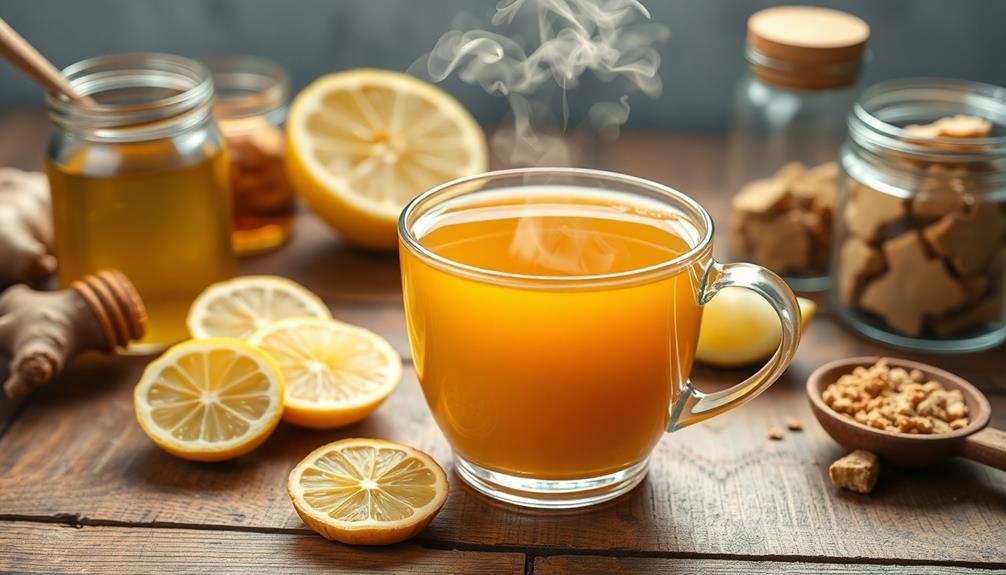
You'll want to serve your ginger tea at the right temperature for the best flavor and experience.
For hot ginger tea, aim for a temperature between 160°F and 185°F (71°C to 85°C), while iced ginger tea should be chilled thoroughly.
If you've made extra, store your ginger tea in an airtight container in the refrigerator for up to 48 hours, reheating or serving over ice as desired.
Proper Serving Temperature
The perfect temperature is key to enjoying ginger tea's full flavor and benefits. For best taste and therapeutic effects, serve your ginger tea between 140°F and 160°F (60°C to 71°C). This range allows the tea's aromatic compounds to release fully without scalding your tongue or diminishing its potency.
If you've just brewed your tea, let it cool for a few minutes before sipping.
To guarantee you're serving your ginger tea at the right temperature, consider these tips:
- Use a kitchen thermometer to check the tea's temperature accurately.
- Pre-warm your cup or mug with hot water to maintain the tea's warmth.
- Cover your tea while it steeps to retain heat and aromatic compounds.
- If the tea's too hot, add a small amount of cold water to bring it to the ideal temperature.
Storing Ginger Tea
Storing ginger tea properly guarantees you'll enjoy its fresh flavor and health benefits for longer.
Once you've brewed your ginger tea, let it cool to room temperature before storing. Pour it into an airtight container, preferably glass, to prevent any plastic flavors from leaching into your tea. If you plan to consume it within a day or two, you can keep it in the refrigerator. It'll stay fresh for up to 48 hours when refrigerated.
For longer storage, consider freezing your ginger tea. Pour it into ice cube trays and freeze until solid. Once frozen, transfer the cubes to a freezer-safe bag or container. This method allows you to store your tea for up to three months. When you're ready to drink it, simply thaw the desired number of cubes.
If you've added honey or other sweeteners to your tea, be aware that this may shorten its shelf life. It's best to store unsweetened tea and add sweeteners just before drinking.
Always check for any signs of spoilage, such as an off-smell or cloudiness, before consuming stored tea. By following these storage tips, you'll make certain your ginger tea remains fresh and potent.
Recommended Daily Intake

While ginger tea offers numerous health benefits, moderation is key. There's no official recommended daily intake for ginger tea, but most experts suggest consuming no more than 4 grams of ginger per day. This equates to about 1-2 cups of ginger tea, depending on its strength. If you're pregnant or breastfeeding, it's best to limit your intake to 1 gram per day.
When incorporating ginger tea into your daily routine, consider the following:
- Start with small amounts and gradually increase to assess your tolerance.
- Monitor any side effects, such as heartburn or digestive discomfort.
- Consult your healthcare provider if you're taking medications, as ginger may interact with some drugs.
- Be aware that ginger can have a mild blood-thinning effect, so avoid excessive consumption before surgery.
Remember that individual responses to ginger can vary. If you experience any adverse reactions, reduce your intake or discontinue use.
While ginger tea can be a beneficial addition to your diet, it's not a substitute for a balanced, healthy lifestyle. Combine it with a nutritious diet and regular exercise for best results.
Potential Side Effects
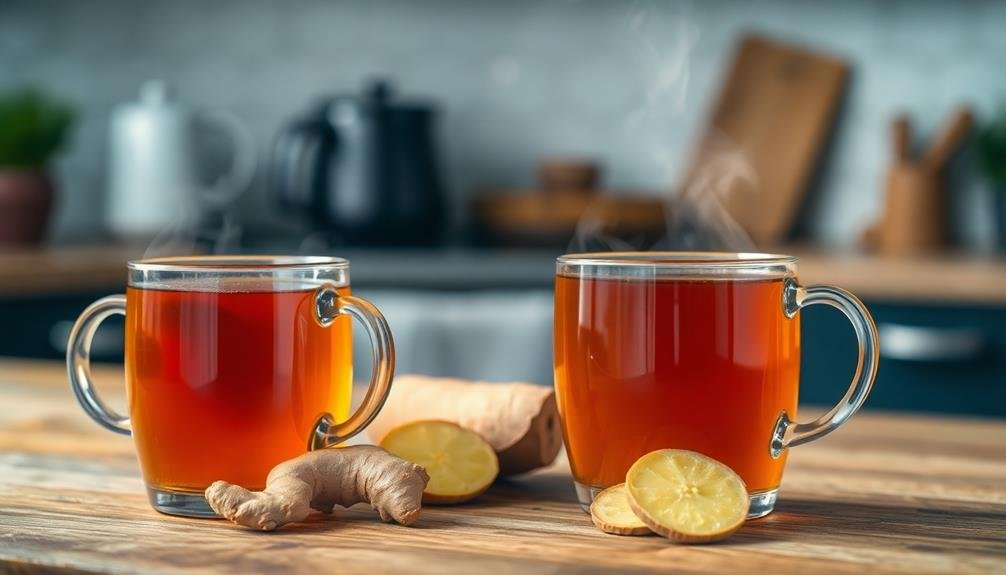
As with any herbal remedy, ginger tea can have potential side effects, especially when consumed in large quantities. While generally safe for most people, you should be aware of possible reactions.
If you're pregnant, consult your doctor before drinking ginger tea, as it may increase the risk of miscarriage in high doses. Those with bleeding disorders or taking blood-thinning medications should exercise caution, as ginger can interfere with blood clotting.
You might experience heartburn, gas, or bloating after drinking ginger tea. If you have a history of gallstones, be careful, as ginger can increase bile production. Some people may develop an allergic reaction, manifesting as skin rashes, itching, or difficulty breathing.
If you're diabetic, monitor your blood sugar closely, as ginger can lower glucose levels. Excessive consumption can lead to dizziness, mild sedation, or heart palpitations.
If you're scheduled for surgery, stop drinking ginger tea at least two weeks prior, as it may interact with anesthesia. Be mindful of these potential side effects and adjust your intake accordingly.
If you experience any concerning symptoms, discontinue use and consult your healthcare provider.
Frequently Asked Questions
Can Ginger Tea Help With Motion Sickness or Nausea During Pregnancy?
Yes, ginger tea can help with both motion sickness and pregnancy-related nausea. It's a natural remedy that's generally safe for most people. You'll find it may ease your symptoms and provide relief when you're feeling queasy.
Is It Safe to Drink Ginger Tea While Taking Blood-Thinning Medications?
You should be cautious about drinking ginger tea while on blood thinners. It may increase the risk of bleeding. Always consult your doctor before consuming ginger tea, as they'll advise you based on your specific medication and health condition.
How Does Ginger Tea Compare to Other Anti-Inflammatory Foods and Beverages?
You'll find ginger tea's a potent anti-inflammatory option. It's comparable to turmeric and green tea, but it's easier to consume regularly. While not as strong as some medications, it's a natural, side-effect-free choice for daily inflammation management.
Can Ginger Tea Be Used Topically for Skin Inflammation or Muscle Pain?
You can use ginger tea topically for skin inflammation and muscle pain. Apply cooled tea as a compress or add it to a bath. It'll soothe irritation and reduce swelling. Always test for sensitivity first.
Are There Any Differences Between Using Fresh Ginger and Pre-Packaged Ginger Tea Bags?
You'll find fresh ginger packs more potent flavor and benefits than pre-packaged tea bags. It's richer in active compounds, offering stronger anti-inflammatory effects. However, tea bags are more convenient and have a longer shelf life.
In Summary
You've now learned how to brew a powerful anti-inflammatory ginger tea. Remember to choose fresh ginger, prepare it properly, and experiment with flavors. Don't forget to mind your steeping time and temperature for the best results. Enjoy your tea hot or cold, and store it correctly for later use. While ginger tea offers numerous health benefits, be aware of the recommended intake and potential side effects. Start sipping and feel the difference in your body!

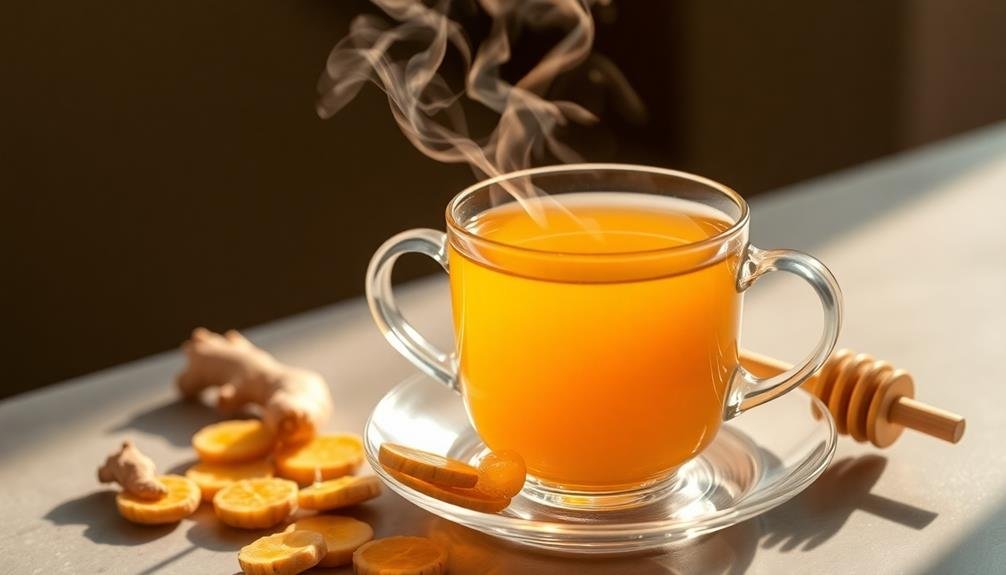


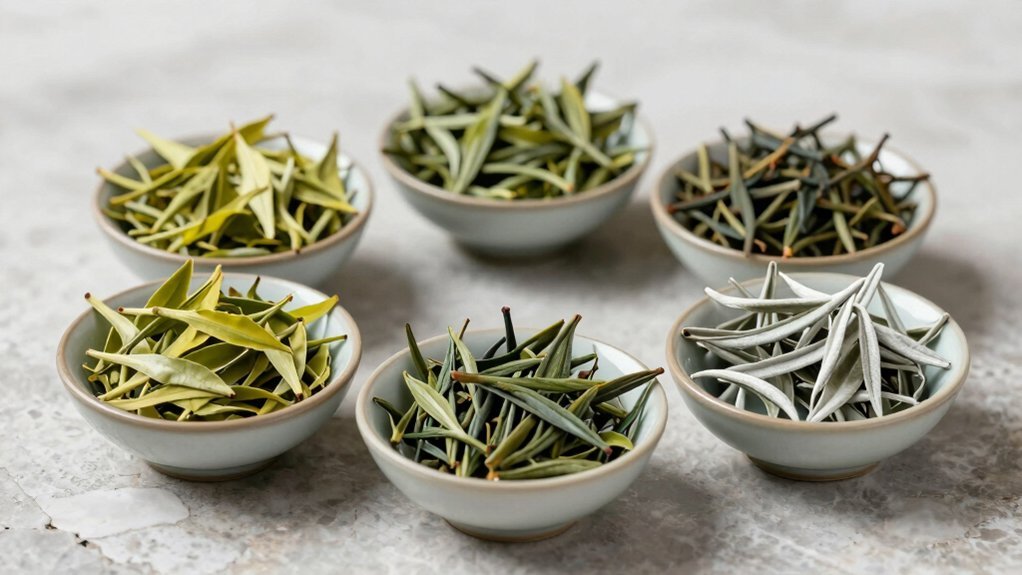
Leave a Reply